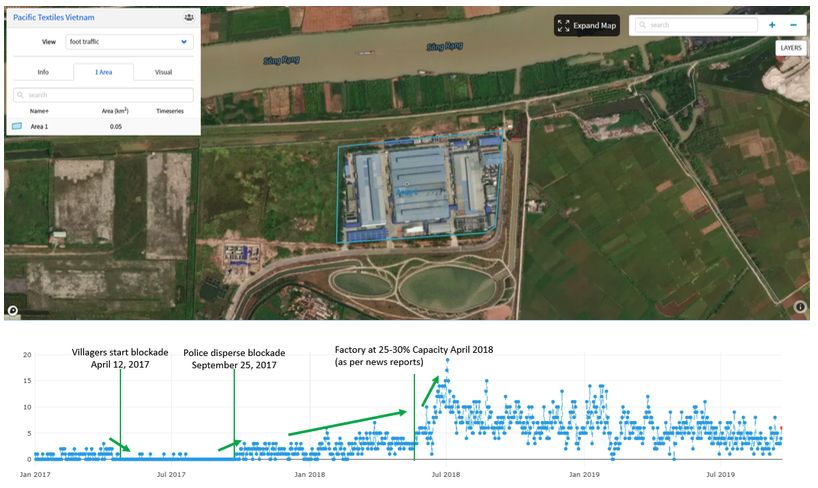- Orbital Insight Blog
- Calculating Supply Chain Disruptions: Pacific Textiles & Crystal Internal Group
Blog
Calculating Supply Chain Disruptions: Pacific Textiles & Crystal Internal Group
Background
In April 2017, approximately two hundred residents of Hai Duong City, Vietnam blockaded the Pacific Crystal textile factory that polluted local water supplies, vowing to continue protests until the company ceased operations and moved from the area.
The factory, co-owned by Pacific Textiles (1328 HK) and Crystal International Group (2232 HK), was producing clothing for Uniqlo aka Fast Retailing (9983 JP) until demonstrators successfully blocked the entrance on April 12, 2017.
Five hundred police officers disbanded the blockade on September 25, 2017, with Pacific Textiles reporting a “significant financial impact” stemming from the factory disruption. Among those impacted was Japanese retail giant Uniqlo.
Production Monitoring with Orbital Insight GO
Orbital Insight GO’s ability to monitor numerous global assets in near-real-time makes it an ideal tool to track production trends and their impact on interconnected supply chains where data is opaque.
By ingesting, interpreting, and analyzing millions of anonymized and aggregated IoT connected devices, we are able to understand workshift trends in Hai Duong City, Vietnam as easily as Flint, Michigan.
In less than ten minutes, we geofenced the Pacific Textiles plant, applied a foot traffic monitoring algorithm, and specified a date range to capture the disruption and post-event production.

Tracking Global Supply Chains
By monitoring bespoke areas of interest, GO users can track any set of global assets to answer their specific questions:
- When will a known disruption end, allowing customers and suppliers to resume business?
- When will competing facilities under construction ramp-up & begin volume production?
- How are downstream and upstream supply chain stakeholders impacted?










